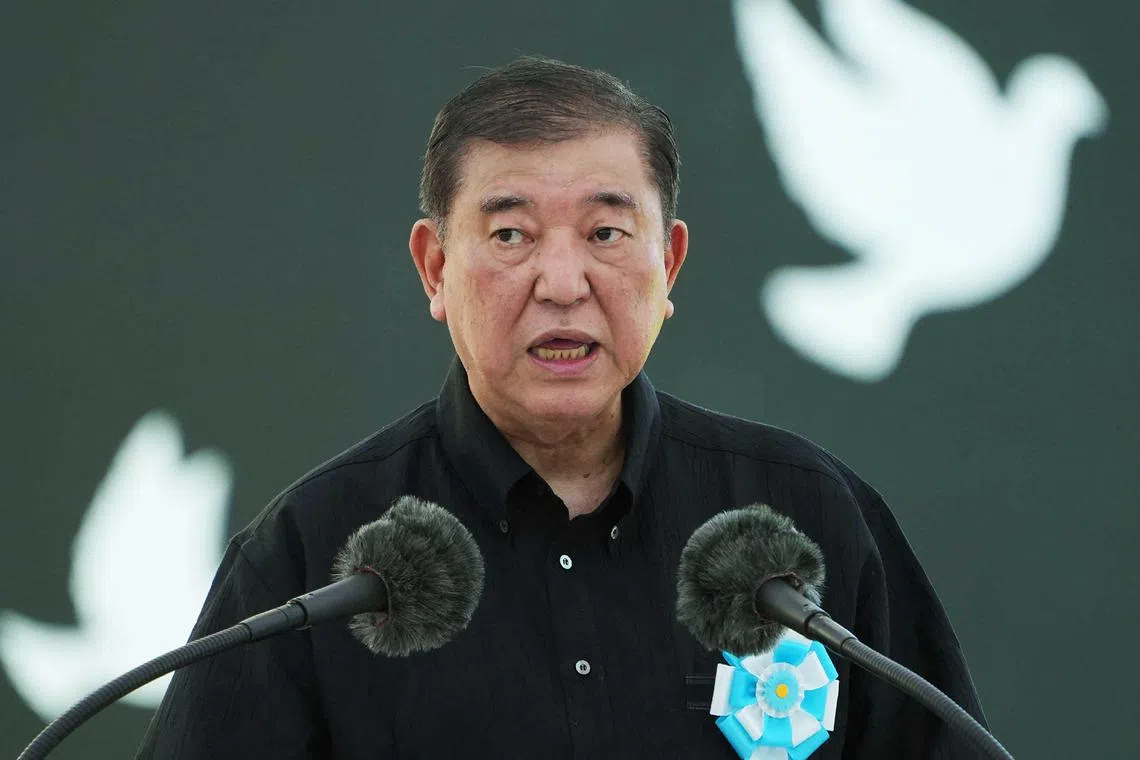Tokyo voters punish Japan ruling party ahead of national election
Sign up now: Get ST's newsletters delivered to your inbox

Public support for Prime Minister Shigeru Ishiba, who took office in October, has been at rock bottom for months, partly because of high inflation.
PHOTO: AFP
Follow topic:
TOKYO – Voters in Tokyo knocked Japan’s ruling party from its position as the largest group in the city assembly, results showed on June 23, a warning sign for Prime Minister Shigeru Ishiba’s unpopular government before the July election.
Japanese media said it was a record-low result in the key local ballot for the Liberal Democratic Party (LDP), which has led the country almost continuously since 1955.
Public support for Mr Ishiba, who took office in October 2024, has been at rock bottom for months, partly because of high inflation, with rice prices doubling over the past year.
The LDP took 21 Tokyo assembly seats in the June 22 vote, including three won by candidates previously affiliated with the party but not officially endorsed following a political funding scandal.
This breaks the party’s previous record low of 23 seats from 2017, according to the Asahi Shimbun daily and other local media.
Mr Ishiba described the results as a “very harsh judgment”.
“We will study what part of our campaign pledge failed to resonate with voters and ensure we learn from this,” he told reporters on June 23.
Tomin First no Kai, founded by Tokyo Governor Yuriko Koike, increased its seats in the 127-member assembly to 31, becoming the largest party.
The funding scandal “may have affected” the result, Mr Shinji Inoue, head of the LDP’s Tokyo chapter, said on June 22 as exit polls were released.
Policies to address inflation “didn’t reach voters’ ears very well” with opposition parties also pledging to tackle the issue, he said.
Cost of living
Within weeks, Mr Ishiba will face an election for Parliament’s Upper House, with reports saying the national ballot could be held on July 20.
Voters angry with rising prices and political scandals deprived Mr Ishiba’s LDP and its junior coalition partner of a majority in the powerful Lower House in October 2024, marking the party’s worst general election result in 15 years.
Polls in June showed a slight uptick in support, however, thanks in part to policies to tackle high rice prices.
Several factors lie behind recent shortages of rice at Japanese shops, including an intensely hot and dry summer two years ago that damaged harvests nationwide and panic-buying after a “mega-quake” warning
Some traders have been hoarding rice in a bid to boost their profits down the line, experts say.
Not including volatile fresh food, goods and energy in Japan were 3.7 per cent higher in May than a year earlier.
To help households combat the cost of living, Mr Ishiba has pledged cash handouts of 20,000 yen (S$175) for every citizen ahead of the Upper House election.
‘Severe’ result
Professor Masahisa Endo from Waseda University described the Tokyo assembly result as “severe” for the ruling party.
“Tokyo is not a stronghold for the LDP, but it’s possible that its support is weakening across the nation,” he said.
Even if Mr Ishiba fails to win an Upper House majority, it is hard to see who would want to take his place, while Japan’s opposition parties are too divided to mount a credible challenge to the LDP’s power, Prof Endo said.
The opposition Democratic Party For the People (DPP) won seats for the first time in the Tokyo assembly vote, securing nine.
The DPP’s campaign pledge for the July election includes sales tax cuts to boost household incomes.
The June 22 voter turnout rate was 47.6 per cent, compared with the 42.4 per cent four years ago, according to local media.
A record 295 candidates ran – the highest since 1997, including 99 women candidates, also a record high.
The number of women assembly members rose to 45 from 41, results showed. AFP

